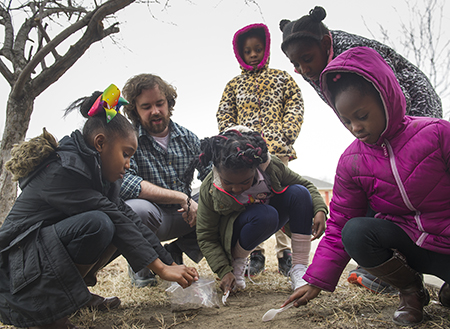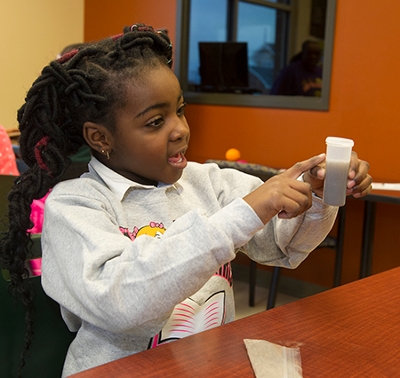 Approximately 60 young girls in Alton, Collinsville, Madison and Venice are learning the value of science, technology, engineering and mathematics (STEM) through an interactive after-school urban gardening program. The future leaders are gaining hands-on experience solving real-world problems.
Approximately 60 young girls in Alton, Collinsville, Madison and Venice are learning the value of science, technology, engineering and mathematics (STEM) through an interactive after-school urban gardening program. The future leaders are gaining hands-on experience solving real-world problems.
The Southern Illinois University Edwardsville Center for STEM Research, Education and Outreach is providing the programming, in partnership with the Madison County Housing Authority (MCHA) and the Mannie Jackson Center for the Humanities (MJCH).
The program builds on the MCHA’s Powered by Girls program by emphasizing plant science and offering students the opportunity to learn science-based urban garden techniques, such as composing and hydroponics, as well as a chance to beautify their communities and create a sustainable food source.
“This spring we are focusing on growing from seeds to full plants, and building raised bed and packaging plants,” said instructor Colin Wilson, manager of the SIUE STEM Resource Center. “This community partnership allows us to use resources efficiently, while reaching much of the region with our STEM education. This type of after-school program is exactly what’s been shown to increase student engagement and lifelong interest in STEM topics.”
 “We are committed to assisting our young girls as they explore the possibility of a career in STEM,” added Marie Nelson, program director with the MCHA. “This program gives girls the opportunity to participate and develop their STEM skills in a relaxed, hands-on, fun environment. Even if a participant does not decide to become a scientist or an engineer, the critical thinking and problem-solving skills they develop will help them become successful in whatever field they choose.”
“We are committed to assisting our young girls as they explore the possibility of a career in STEM,” added Marie Nelson, program director with the MCHA. “This program gives girls the opportunity to participate and develop their STEM skills in a relaxed, hands-on, fun environment. Even if a participant does not decide to become a scientist or an engineer, the critical thinking and problem-solving skills they develop will help them become successful in whatever field they choose.”
Participants are eager to learn and do their part to grow healthy fruits and vegetables in their own backyard.
“Learning about the environment is a good pleasure,” said Malia King, an 8th grade student from Venice. “I always try to do whatever I can to help any plant or person.”
“Mr. Colin explains things step by step and we get to do hands-on projects,” added 5th grade student Trinity Compton, of Venice. “I like this after-school program, because it influences me to do better things.”
“The MJCHF is proud to partner with the MCHA and the SIUE STEM Center, as SIUE has developed a proven reputation for its outreach programming in underrepresented and low-income areas,” said Dr. Ed Hightower, executive director of the MJCHF. “The MJCHF believes it has a moral obligation to foster positive interaction of youth through STEM and other educational opportunities. The Foundation’s focus is inclusiveness of youth of different cultures, races and ethnicities. Many of the youth served by the MJCHF reside in public low-income housing developments and live at or below the poverty level, with limited access to healthy STEM opportunities.”
The Southern Illinois University Edwardsville Center for STEM Research, Education and Outreach comprises an independent group of researchers and educators, innovating ways to engage students and the public in science, technology, engineering and math (STEM). Within the SIUE Graduate School, the Center brings together research faculty, graduate students and practitioners to conduct education research. The Center contributes educational expertise to SIUE undergraduate classes and provides professional development for K-12 teachers. The Center boasts a significant library of equipment and resources, which are available for loan at no cost to campus and regional instructors. For more information, visit https://www.siue.edu/stem/about.shtml or contact STEM Center Director Sharon Locke at (618) 650-3065 or stemcenter@siue.edu.
Madison County Housing Authority Mission Statement: To provide safe, quality affordable housing to low income families in Madison County; and to promote personal responsibility and self-sufficiency of residents while maintaining the fiscal integrity of the agency.
Mannie Jackson Center for the Humanities Mission Statement: The MJCH conducts activities that promote mutual understanding and respect among people of different cultures, races, ethnicities, religions, and other distinctions; influence positive social change by transforming attitudes and perceptions towards greater acceptance, tolerance, and interaction among these groups; and ultimately remove barriers that hinder individuals and groups from realizing their aspirations and full potential.
Photos: SIUE STEM Resource Center Manager Colin Wilson instructs a group of girls from Venice as they gather soil samples during their after-school urban gardening program.
Second grade student Zylah Howard looks excitedly at the soil sample her group collected for a lesson on soil chemistry.